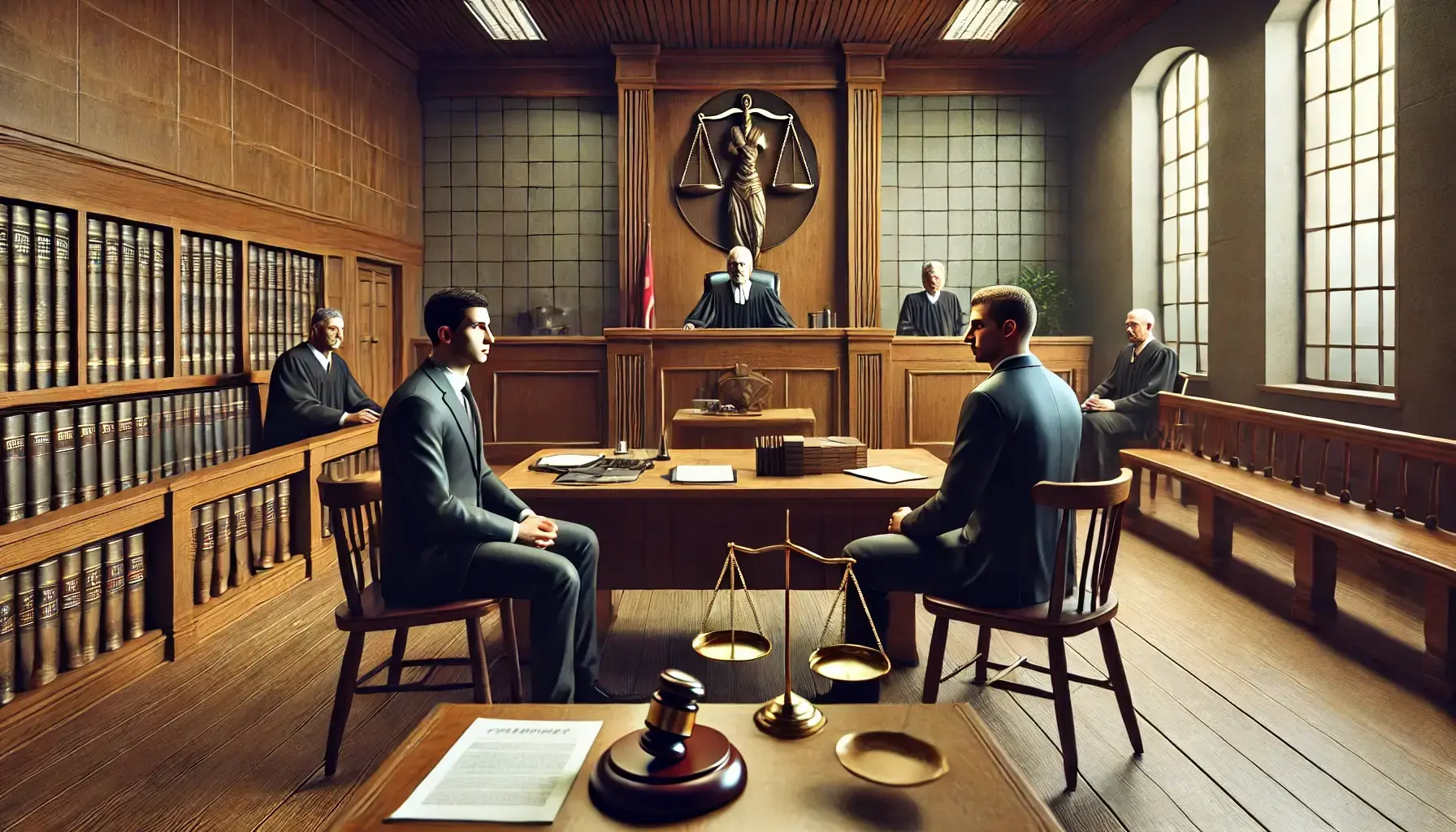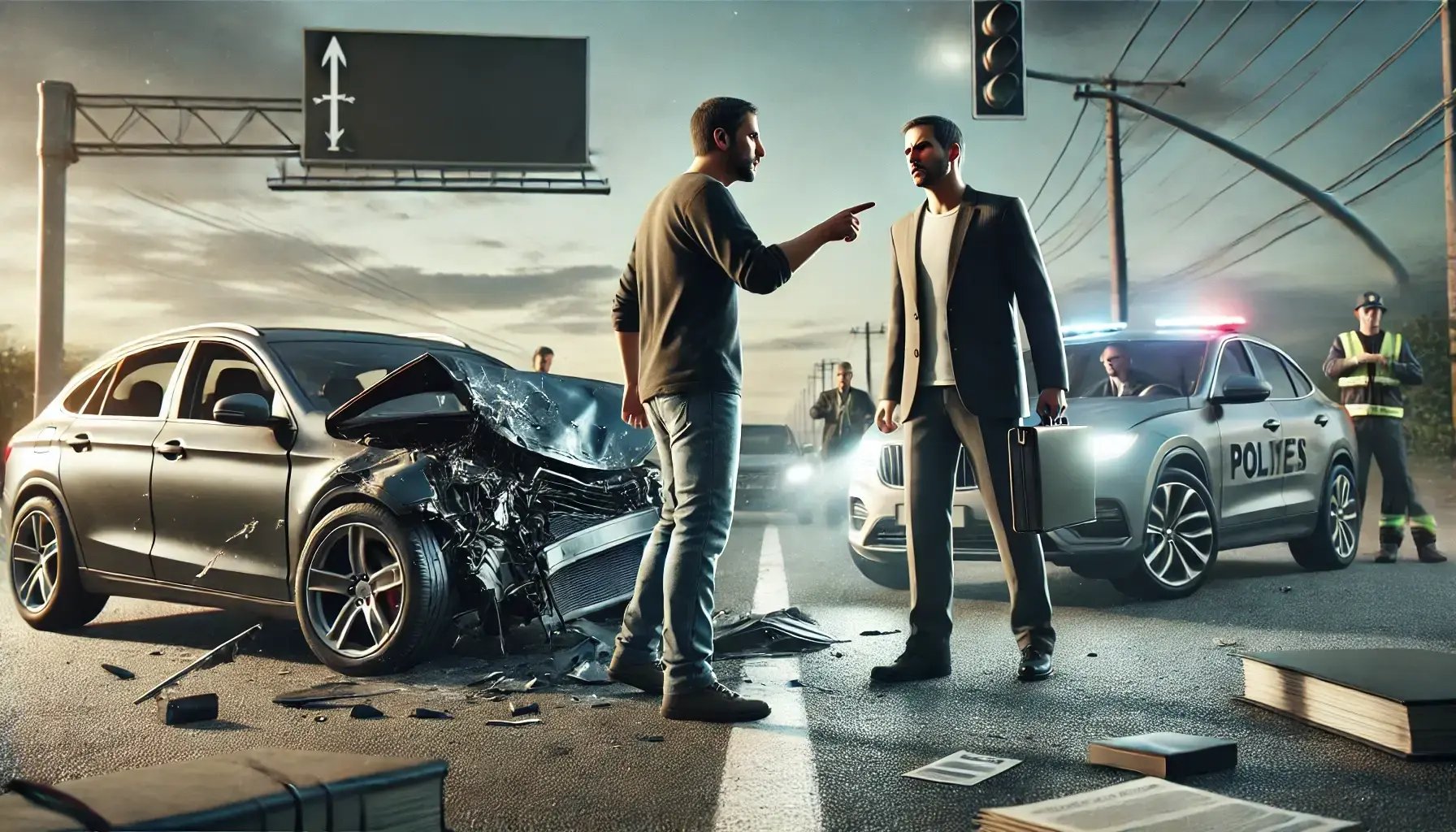Can someone sue you for a car accident if you have insurance?

Legally reviewed by:
Daniel Smith August 15, 2024
Lawsuits and insurance coverage are two different ways to deal with car accidents, so yes, you can be sued for a car accident even if you have insurance.
However, it is crucial to understand that having insurance reduces the likelihood of a lawsuit after a car accident. With insured drivers, car accidents are unlikely to develop into lawsuits, and even when they do, they are usually only triggered by peculiar circumstances we discuss subsequently.
However, it is vital to examine the relationship between car insurance and liability in car accidents to properly understand why a lawsuit may develop.
Understanding Auto Insurance and Liability
Auto insurance generally refers to coverage plans that protect a vehicle's driver (and usually passengers) by providing financial assistance in the event of property damage or injury. Depending on the coverage type, insurance will be triggered in certain circumstances.
Types of auto insurance coverage
The most common types of auto insurance are:
- Collision coverage to cover repairs or replacement when your vehicle is involved in any crash. This type of coverage protects your vehicle regardless of fault. This coverage is not required by law but may be required by a lender or leaseholder.
- Comprehensive coverage compensates in case of non-collision damage to your car. Damage protected against here includes vandalism, theft, fires, and acts of nature. This coverage is also optional.
- Personal Injury Protection (PIP) protects against any injury by covering medical expenses and lost wages for the driver and passengers involved in a car accident. It is also known as no-fault insurance because you do not have to depend on the at-fault driver to recover medical expenses. 12 states, including Oregon (Or. Rev. Stat. §742.520) and Utah (Utah Code § 31A-22-302), make it compulsory for drivers to carry PIP, but some other states allow people to purchase it optionally.
- Medical payments or MedPay is a coverage generally available in states that don’t offer PIP, although, some states offer both. Both PIP and MedPay are designed to cover medical expenses. But while PIP offers a broader coverage to include things like lost wages, MedPay does not.
- Uninsured or underinsured coverage offers protection if you are ever in an accident with an uninsured or underinsured driver, and the driver’s liability insurance should have catered to your damages.·
Liability Insurance
What liability insurance covers
Liability insurance is the most popular type of auto insurance. It is responsible for protecting you from financial liability in an accident where you are responsible for bodily injury or property damage suffered by someone else.
Injury policy for the accident victim will provide for things like prescriptions, suffering, and medical expenses. Property damage policy, on the other hand, will provide for damages to buildings, repairs to the other car(s), and rental car payments.
Liability insurance will also cover your legal fees if the victim sues you for injury or property damage.
All states, apart from New Hampshire, require drivers to purchase some sort of liability insurance; even in New Hampshire, drivers are required to show proof of financial responsibility which most do by purchasing liability coverage.
Limits of liability coverage
The limit is the maximum amount up to which your insurer will be responsible after an accident and state law determines the minimum liability coverage and its limits.
In Missouri (Mo. Rev. Stat. § 303.190), the minimum possible coverage should offer a maximum of $25,000 per person for bodily injury, $50,000 per accident for bodily injury, and $25,000 per accident for property damage or 25/50/25. Meanwhile in Virginia (Va. Code Ann. § 46.2-472), the minimum coverage limit is 30/60/20.
Naturally, many people opt for the minimum coverage plans and their limits. But, liability coverage limits could go as high as $500,000 for bodily injury and property damage, depending on the nature of the plan and premiums.
When You Can Be Sued

As we’ve established, even though insurance (particularly liability coverage), reduces your exposure to car accident lawsuits, it does not make you immune to them. In certain circumstances, you may still be sued, and those circumstances include:
Damages exceeding policy limits
If the accident victim sustains damages beyond your policy limit, you will likely get sued for the compensation balance. For instance, if an accident you cause destroys person A's car such that A has to replace it for $45,000. But before the vehicle can be replaced A has to rent a car to get around town for two weeks, and that costs $700. You will likely be liable to A for at least $45,700.
Let's also assume that you only purchased the minimum liability coverage in your state with a $20,000 limit for a property damage policy. Even when A receives this $20,000, they will likely sue for the remaining $25,700.
Intentional acts or gross negligence
If the accident victim believes you have been malicious (caused the accident with intent to cause injury to them) or been grossly negligent (caused extreme risk while being indifferent about their wellbeing), they could sue.
Beyond seeking compensatory damages for their injury, intentional acts or gross negligence will allow the injured to seek punitive or exemplary damages solely to punish you for the accident.
Severe injuries or fatalities
Victims of an accident that causes severe injuries and deaths will be more predisposed to sue since a jury will prioritize giving them justice, not just compensation. In wrongful death or significant bodily injury lawsuits, the plaintiffs could seek a combination of damages.
First, they could seek economic damages to compensate them for medical expenses, lost valuables, and property repair costs. They could also seek non-economic damages to cover pain and suffering, lower quality of life, and loss of any body function.
Finally, they could sue for punitive damages with economic and non-economic damages.
Dispute over claim value
If your insurance company and the accident victim cannot agree on a settlement value both parties are comfortable with you will likely get sued for financial compensation. Although parties often reach an agreement on the negotiation table, insurance companies sometimes refuse to pay if they feel the claim value is inflated.
Disputes over fault
Fault and negligence laws will likely affect your financial liability depending on state laws. If your insurance company and the accident victim disagree over your degree of fault and responsibility in the accident, it will likely result in a lawsuit against you. Fault and financial liability will then be determined in court.
If a dispute over fault results in a lawsuit for you, it would be extremely helpful to have a good attorney who is well-versed in your state’s negligence and fault laws.
Unreasonably long settlement process
If the accident victim feels like the settlement process is taking too long, they will likely sue you to either hasten the process or to just seek compensation from you directly. They may also sue your insurance company if they feel your insurance company has acted in bad faith throughout the settlement process.
Failing To Report An Accident
Failing to report an accident may also result in a lawsuit, even when you have insurance. Here's how:
Legal requirements for reporting accidents
The circumstances under which you must report accidents, and how you should report them are determined by state law. Maryland law (Md. Code Transp. Law § 20-104 & § 20-105), for instance, requires that accidents resulting in bodily injury, death, or property damage to attended or unattended vehicles should be reported to the police.
A written report of the accident must also be made to the Motor Vehicle Authority within 15 days if the accident causes bodily injury or death.
Meanwhile in Texas, Texas Transp. Code § 550.026, requires that you immediately call the local police department or sheriff’s office if an accident results in injury, death, or damage to the vehicle such that the vehicle cannot be normally and safely driven.
If the police do not investigate your accident, you must make a written report to the Texas Department of Transportation within 10 days, if the accident caused apparent property damage of over $1000.
Having an attorney is always helpful while navigating local reporting requirements. As a general rule, it is always best to also report the accident when dealing with a drunk, uninsured, or hit-and-run driver. Getting a good car accident lawyer as soon as possible will further reduce your exposure to potential lawsuits.
Regarding insurance, it is also pertinent to report an accident to your insurance company as soon as possible. Your coverage policy will likely specify a time frame within which you must notify your insurer of any accident you're involved in.
If you know the time frame, stick to it and if you do not, you should report as soon as you reasonably can.
Consequences of not reporting
When you fail to report to the police or any other relevant authority, it could result in a criminal lawsuit against you. In Montana, Mont. Code Ann. § 61-7-118 provides that a driver who fails to report an accident could be convicted.
Upon conviction, such driver could face 20 days in prison for a first offence, and up to 6 months in jail for a third conviction within 1 year of the first conviction.
Failing to notify your insurance company also increases the likelihood of a lawsuit against you.
How failure to report affects insurance claims
When you do not report to your insurance company as you should under your policy coverage, they may deny the claim of anyone who tries to claim settlement under your insurance.
When their claim is denied, a victim will likely resort to a lawsuit against you.
What If The Other Driver Was Partially At Fault?

We mentioned earlier that state law on fault and negligence affects the insurance settlement and car accident lawsuit process significantly. This is due to comparative negligence and partial fault.
Comparative negligence explained
Comparative negligence is a legal principle you can rely on in court to argue that you should not be solely responsible for any financial liability, especially when another party shares responsibility for the accident.
To illustrate, if the other driver is deemed 30% responsible for the accident, you could argue that you should not bear the cost of the full damages. If your defense is successful, the other driver will be financially liable for 30% of the damages.
State variations in negligence laws
Different states adopt different negligence laws that affect the application of comparative negligence. They are:
Pure contributory negligence states
In these states, if the other driver contributed to the accident in any way, they will not be entitled to any damages. This means if the other driver is found to be even 1% responsible for the accident, he will not be able to recover any damages from you in court.
This variation is practiced in Alabama (Jackson v. Waller, 410 So.2d 98 (1982)), Maryland, North Carolina (Sorrells v. M.Y.B. Hospitality Ventures, 332 N.C. 645, 648 (1992)), Virginia, and The District of Columbia.
Pure comparative fault states
These states will allow you to raise the comparative negligence defense if you're not 100% responsible for an accident. This means that even if the other driver was 1% responsible, you will be able to discount the total damages you should be financially liable for by that 1%. Florida (Fla. Stat. § 768.81), New Mexico (N.M. Stat. § 41-3A-1(B)), and 10 other states use this variation.
Modified comparative fault states
This is the most popular variation, and it has two types: the 50 percent and the 51 percent bar rule. The 50 percent bar rule means that the other driver will not be allowed to get any damages from you if they are found to be 50% or more at fault. The 50% rule is practiced in states like Georgia (Ga. Code § 51-12-33) and Wyoming (Wyo. Stat. Ann. § 1-1-109(b)).
Meanwhile, the 51% bar rule means that the other driver will not be allowed to recover damages if they are found to be 51% or more at fault. It is practiced in states like Indiana (Ind. Code § 34-51-2-6) and New Hampshire (N.H. Rev. Stat. Ann. § 507:7-d).
How partial fault affects lawsuits
When the fault is shared between drivers, it could either increase the likelihood of lawsuits or decrease it. For instance, partially responsible drivers will likely institute action in pure comparative fault states and modified comparative fault states because they will be entitled to damages as long as their negligence is less.
But, in pure contributory negligence states where partial fault will bar recovery, lawsuits are less likely.
How Lawsuits Vary Between States
Beyond negligence, state law still has a significant impact on whether you will get sued for a car accident.
No-fault vs. at-fault states
No-fault states require all drivers to have PIP coverage so medical expenses and lost wages resulting from an accident are covered by each driver's insurance regardless of who is at fault. Meanwhile, the insurance of liable drivers will ordinarily bear the responsibility in at-fault states.
Most no-fault states have laws that prevent accident victims from instituting a lawsuit against the at-fault driver at will. For these at-fault states, the injuries sustained must be severe and expenses from these injuries must exceed the minimum allowable PIP limit.
These laws reduce the likelihood of lawsuits in no-fault states compared to at-fault states.
Statute of limitations differences
Different states also have varying statutes of limitation that determine the timeframe within which anyone with the right to sue you for an accident must do so.
Idaho (Idaho Code Ann. § 5-218 & § 5-219) provides that accident victims have three years from the date of the accident to bring a property damage suit, and two years to institute an injury or wrongful death suit.
For Oklahoma (Okla. Stat. tit. 12 § § 95 & 1053), anyone instituting an injury or property damage suit must do so within two years of the accident, while a wrongful death suit must be within two years from the death.
Having an attorney will likely help to determine the exact statute of limitations applicable to your state and the particular accident. An attorney will also be able to raise the statute of limitations as a defense on your behalf when applicable.
Steps To Take if You’re Sued After A Car Accident
If you’ve been notified of a car accident lawsuit against you, here’s what to do:
Notifying your insurance company
First, inform your insurance company that you’re being sued. The lawsuit may be a strategy to force your insurer to settle the case faster. And even if it’s not, your liability coverage should cover your legal fees.
Gathering evidence and documentation
Next, you should gather as much evidence and documentation as you still can about the accident. A police report, pictures, and videos of the accident, as well as receipts for car repairs or anything, might be helpful.
The goal here is to be able to put together your version of the accident.
Seeking legal representation
Finally, legal representation is essential. Even when you should ordinarily be financially liable, a good lawyer might be able to find exceptions to liability rules and find ways to reduce your liability.
Conclusion
In conclusion, you can still be sued even if you are insured for various reasons. For instance, if the accident victim cannot agree on a settlement with your insurer, thinks you've acted intentionally with malice, or the settlement process is taking too long for them.
However, the more common cause of lawsuits, even with insurance, is when the damages being claimed are over your policy limit.
Therefore, you cannot underestimate the importance of adequate insurance coverage. Going through a lawsuit can be very stressful, resulting in you paying damages beyond the injury or damage to the victim.
But even if you have to go through a lawsuit, you do not have to worry because having a good lawyer improves the experience. And if you have no idea how to find a good lawyer in your area, we can help!
At The Accident Helpers, we connect people like you to the expert legal representation you need for free. Simply share your case details with us, and we’ll put you in touch with an attorney.




